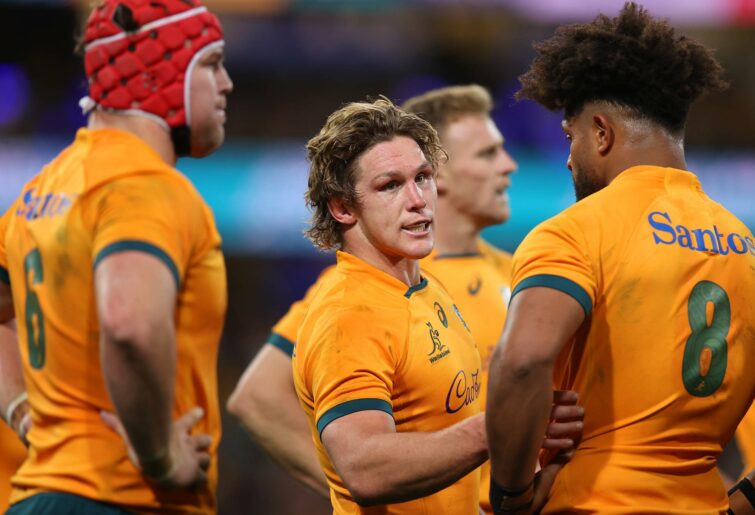
Blurring the lines of ruck formation, McCaw had tricks up his sleeve that brought once scintillating opposition attacks to a slow and sluggish pace that favoured the All Blacks’ wider defence and counterattack for many years.
Many have pondered the Wallabies’ recent rollercoaster of wins and losses, trying to analyse where our problems lie. Some have correctly alluded to the recent head-scratchers in attack, with a lack of discipline and failing to earn the right to go wide, silencing the lethal pace of Marika Koroibete and the footwork of Len Ikitau.
But since losing David Pocock, Australia has lacked the genuine ruck threats to consistently compete.
I was in the crowd at Murrayfield last November for Scotland vs Australia. I left both bitterly cold and stunned at the Wallabies’ inability to nullify or replicate the efforts of Hamish Watson.
Watson, who won man of the match for his performance, carried his team to a victory heard around Edinburgh. With 14 tackles and a few forced turnovers, Watson’s presence both in and post tackle starved the Wallabies of quick ball, allowing his fellow backrowers to reset and compile more pressure on a tiring attack.
Scotland were not special that day. None of their attack would label them a World Cup contender, nor were their tactics anything brilliant. They won because of their supremacy at the breakdown.
This presence is not just an ability to win turnovers and force penalties, it extends to physical contests, constant pressure, sniffing for opportunities, and disrupting the rhythm of opposition attack.
Whether it be counter-rucking pressure, strong driving tackles or a clever rolling away attempt, players such as Watson, Josh van der Flier or Ardie Savea have plagued Australia at the breakdown.
Michael Hooper has a ball-carrying roll, often scampering through tired defensive lines to proved a breath of life in attack. But he is not is a ‘fetcher’. The ability to sniff the ball and apply breakdown pressure is not in his arsenal.
Because of Michael Cheika’s consistent selection of both Pocock and Hooper, and glossed over because of Hooper’s inspirational efforts elsewhere, some have looked elsewhere for the solution to Australia’s problems.
But because Hooper is not a fetcher and the other recent back row selections – including Harry Wilson and Rob Valetini – are abrasive ball-carrying options, Australia have been left in the lurch at the breakdown.

(Photo by Mark Kolbe/Getty Images)
With Hooper having courageously stepped away from international rugby, I would like to see selectors persist with Fraser McReight.
Australia’s best fetcher since Pocock, McReight offers a formidable defensive presence that forces attacking sides to move the ball away from him.
What McReight also offers, which goes unnoticed, is his support play, both in attack and defence. He has subtle hands and a knack for linking well with his inside backs – evidenced by some of his recent tries in both the Pacific Nations Cup and Super Rugby.
In defence, McReight’s ability to remain alive post-tackle offers an important advantage with upcoming Test matches against South Africa and New Zealand.
Further, with Valetini’s robust, ball-carrying capabilities better suited to the blindside flank, the second solution to breakdown woes is the blooding of young Waratah Will Harris.
In attack, Harris is a slick ball player whose athleticism and interplay with outer backs formed an undeniable part of the Waratahs’ turnaround season in 2022. In addition, he brings the constantly abrasive defensive pressure Australia has lacked in recent memory.
Forming an integral part of the Junior Wallabies success in 2019, Harris’ indissoluble defensive interplay with the likes of McReight set the tone for some scintillating counterattack from the likes of Isaac Lucas and Noah Lolesio.
With the physicality to dominate tight defensive contests, and the athleticism to cover inside and outside backs in the wider channels, the 22-year-old’s aggression and awareness make him an impressive force to watch.
Defensive pressure kills ascendency. With the likes of France and New Zealand desperate for success at the World Cup, Australia need defensive threats that can halt opposition quick ball and force panicked rugby.
Should they do so, the Wallabies have the attacking shapes and threats to make a serious run.


Leave a Reply